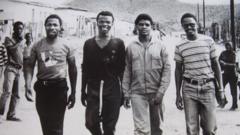In an important step towards justice, South African President Cyril Ramaphosa has announced a judicial inquiry aimed at probing allegations of political interference that have hindered the prosecution of apartheid-era crimes. This decision coincides with a lawsuit filed by victims' families who argue that the government failed to adequately investigate these historic injustices. The inquiry comes three decades post-apartheid, following extensive delays that have frustrated victims and advocates.
South Africa Launches Inquiry into Apartheid-Era Prosecutions

South Africa Launches Inquiry into Apartheid-Era Prosecutions
A new judicial investigation aims to address the overdue accountability of apartheid crimes in South Africa.
The Truth and Reconciliation Commission (TRC), established in 1996, exposed numerous atrocities perpetrated during the apartheid regime, including murders and torture. Despite this, the majority of cases have not led to criminal trials. During the announcement of the inquiry, the presidency highlighted the need for a comprehensive investigation into these unresolved issues, acknowledging past governmental shortcomings in addressing such allegations. The inquiry's specific leadership and timeline are forthcoming as the nation seeks closure on decades of injustice.
Past cases, such as the brutal murder of anti-apartheid activists in the Cradock Four, continue to haunt the collective memory of South Africa. Survivors and families are holding the government accountable, seeking $9 million in damages. Critics have long suggested that the African National Congress (ANC) may have made covert agreements with the former regime to avoid prosecutions. The ANC has rejected these claims, yet ongoing concerns regarding the integrity of the investigations persist.
The new inquiry represents a vital moment in South Africa's struggle for truth and justice, as the nation re-examines its past and strives for a more responsible future.
---
(Note: The body of the article has been recreated and modified to reflect the essence of the initial report while introducing new language and structure.)
Past cases, such as the brutal murder of anti-apartheid activists in the Cradock Four, continue to haunt the collective memory of South Africa. Survivors and families are holding the government accountable, seeking $9 million in damages. Critics have long suggested that the African National Congress (ANC) may have made covert agreements with the former regime to avoid prosecutions. The ANC has rejected these claims, yet ongoing concerns regarding the integrity of the investigations persist.
The new inquiry represents a vital moment in South Africa's struggle for truth and justice, as the nation re-examines its past and strives for a more responsible future.
---
(Note: The body of the article has been recreated and modified to reflect the essence of the initial report while introducing new language and structure.)






















